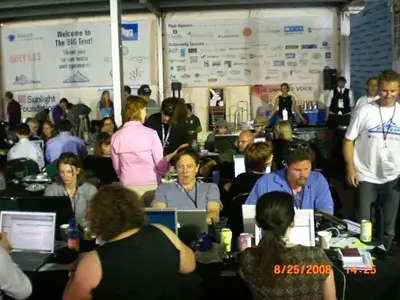by
Sal Peralta, August 30, 2008
During the coming months, various interests will be debating the Open Primary system that will be on Oregon's ballot as Measure 65 this November.
WHAT IS THE OPEN PRIMARY?
The Open Primary will create a single primary in which any Oregon voter may vote for any candidate on the primary ballot, and the top two candidates will move on to the general election.
Opponents of the measure have expressed concerns that the Open Primary will raise the cost of our elections, take the power to nominate candidates away from political parties, and harm minor political parties, effectively denying them a spot on the November ballot.
GIVING EVERY VOTER A VOICE
The Open Primary is about giving all voters a say in who will appear on the ballot in November. Oregon's current system discriminates against the 400,000 Oregon voters who are not affiliated with a major party. Because these voters do not have a choice on the May Primary ballot in the most important races, most of them choose to stay home.
Democrats, who had a contested Presidential Primary turned out 77 percent of their voters in the May election. 55 percent of Republicans turned out, while the turnout among non-affiliated voters and minor party members was less than 30 percent -- mostly because they had nothing to vote for except for possibly a local ballot measure or a non-partisan primary.
Even opponents of the measure, such as Lewis and Clark Professor, Paul Gronke, a partisan Democrat, concede that the Open Primary will likely increase turnout among non-affiliated voters by at least 3-5% -- though proponents, such as former Secretaries of State Phil Keisling and Norma Paulus, contend that the increase in turnout will likely be much higher across all political parties and NAV's.
GIVING EVERY VOTER A CHOICE
During the current election cycle, 44 percent of legislative races, including 8 out of 15 senate races, and 2 out of 5 statewide races, will not be contested in November, meaning that the primary election may result in a candidate being elected to public office despite only having the suport of 12 to 13 percent of voters in a given legislative district.
The general election in such races is really more of a coronation than a contest. The Open Primary will give voters in many of these uncontested districts an honest choice in November.
WHAT ABOUT MINOR PARTIES?
Though it is true that some legislative changes will need to be made in order to protect the ballot status of most minor parties in Oregon, and the federal status of all political parties, there is no reason to suppose that these housekeeping measures will not move through the Oregon legislature.
MORE BALLOT ACCESS, NOT LESS
Under Oregonʼs current system, minor political parties do not appear on the primary ballot. The Open Primary will give them access to the primary ballot for the first time in the history of the state.
Moreover, the Open Primary will give Independents and other minor parties that choose to cross-endorse candidates more ballot access, not less. Under the current system, minor political parties that choose to cross-nominate candidates may not have their names printed on the ballot. Under the Open Primary, every political party will have the power to endorse candidates and have those endorsements appear on the ballot.
A FAIRER ELECTION CALENDAR
The current system also sets up an election calendar that badly discriminates against minor political parties.
We cannot guarantee credible Independent candidates a one-on-one general election -- the only type of election where minor party candidates have any chance of winning -- until June or later. In some cases, as in House District 29 where the Independents ran Terry Rilling, a former Mayor of Cornelius, we did not know whether we would have a one-n-one race until August 26th.
In another case, we have cross-nominated Joel Haugen for US Congress. Haugen won the Republican nomination with more than 70 percent of the vote, and was the unanimous choice of the Independent Party's nominating caucus. But the only way for him to appear on the ballot as an Independent is for him to give up his Republican nomination, meaning that he could face a Republican opponent in November if the Republicans hold a nominating convention in the next few weeks.
WHAT ABOUT THE COST OF ELECTIONS?
Oregon is one of only three states that has no limits of any kind on political contributions. We need campaign finance reform to help restore government to the hands of the People of this state. However, those concerns are quite independent of this particular measure, and it is worth mentioning that both Paulus and Keisling are on record as being in support of a reasonable system of contribution limits and/or publicly financed elections.
CONCLUSIONSThe Open Primary will result in a less polarized Oregon, and an Oregon where non-affiliated voters and Independents have a greater role to play in our democratic process. In my view, Independents and non-affiliated voters will benefit from playing on a more level playing field, rather than one that is slanted to benefit the major political parties.
Your Mileage May Vary.
Sal Peralta blogs at OregonIndependent.com

























